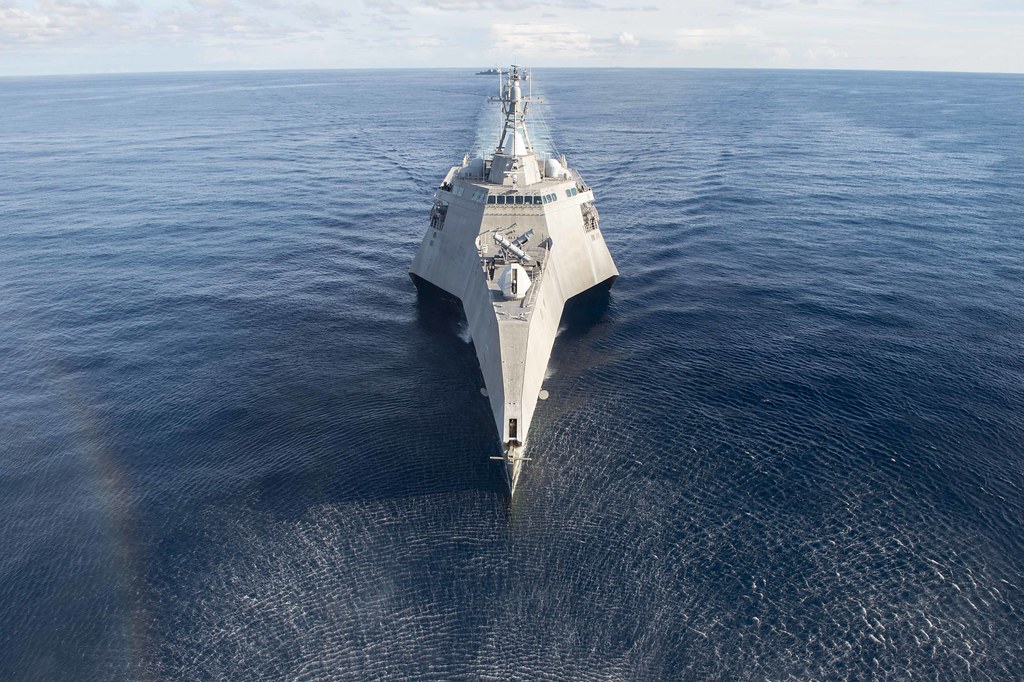By MC3 Deven Leigh Ellis, Destroyer Squadron 7 Public Affairs
USS Coronado (LCS 4) sails during a photo exercise as part of multilateral CARAT exercise with the Republic of Singapore and Royal Thai navies, May 11. (U.S. Navy/MC3 Deven Leigh Ellis) >>
CHANGI NAVAL BASE, Singapore - Littoral combat ship USS Coronado (LCS 4) completed the second-annual multilateral Cooperation Afloat Readiness and Training (CARAT) exercise with ships from the Republic of Singapore and Royal Thai navies, May 12.
As the premier naval engagement in South and Southeast Asia, CARAT provides a regional venue to address shared maritime security priorities, enhance interoperability among participating forces and develop sustained naval partnerships with nations across South and Southeast Asia.
The three-day training exercise continued with the long-standing tradition of enhancing interoperability, addressing shared maritime priorities and developing sustained naval partnerships among participating regional forces.
"This year's multilateral CARAT was a positive step in the multilateral initiative as it demonstrates trust between all three Navies that has been gained from years of working together bilaterally," said Capt. Alexis Walker, deputy commodore, Destroyer Squadron 7. "This event is significant because it is the first co-located trilateral CARAT event at sea."
Ships participating in this year's exercise included the Arleigh Burke-class guided-missile destroyer USS Sterett (DDG 104), currently deployed as part of the Sterett-Dewey surface action group; Formidable-class frigate RSS Intrepid (FFS 69) from the Republic of Singapore navy; and the Naresuan-class frigate HTMS Naresuan (FFG 421) from the Royal Thai navy.
The four ships executed a full schedule at sea including tracking exercises, a gunnery exercise, air defense exercise, communication drills as part of a flash exercise, photo exercise, and visit, board, search and seizure (VBSS) training.
U.S. and Royal Thai Sailors joined together to form a combined VBSS team, which then boarded the Intrepid via a rigid-hull inflatable boat and conducted a full sweep of the ship. Chief Fire Controlman Adam Hoffer, Coronado's team lead for the exercise, extolled the benefits of cooperative training in such an exercise.
"The VBSS portion of the exercise was a resounding success in all facets," said Hoffer. "The ability to exchange subject matter with our partner nations in an advanced operational scenario is priceless. In working with both Singapore and Thailand navies, we expanded our relationship not only militarily, but also culturally."
Coronado also participated in ship-rider exchanges with Intrepid and Naresuan, enhancing the partnership aspect of the exercises.
"LCS is the right platform to execute CARAT exercises because it is similar in size and capability to the ships from our partner nations," said Walker. "This makes the rider exchanges more fruitful because the conversations and information exchanged can be done so from a place of common experience from operating in similar platforms."
Currently on a rotational deployment in U.S. 7th Fleet area of responsibility, Coronado is a fast and agile warship tailor-made to patrol the region's littorals and work hull-to-hull with partner navies, providing 7th Fleet with the flexible capabilities it needs now and in the future.
On behalf of Commander, Task Force 73, Destroyer Squadron 7 serves as operational commander for littoral combat ships rotationally deployed to 7th Fleet, and conducts advanced planning, organizes resources, and directly supports the execution of maritime engagements such as the Cooperation Afloat Readiness and Training (CARAT) exercise series, the Naval Engagement Activity (NEA) with Vietnam, and the multilateral Southeast Asia Cooperation and Training (SEACAT) exercise with Bangladesh, Cambodia, Brunei, Indonesia, Malaysia, the Philippines, Singapore, and Thailand.

